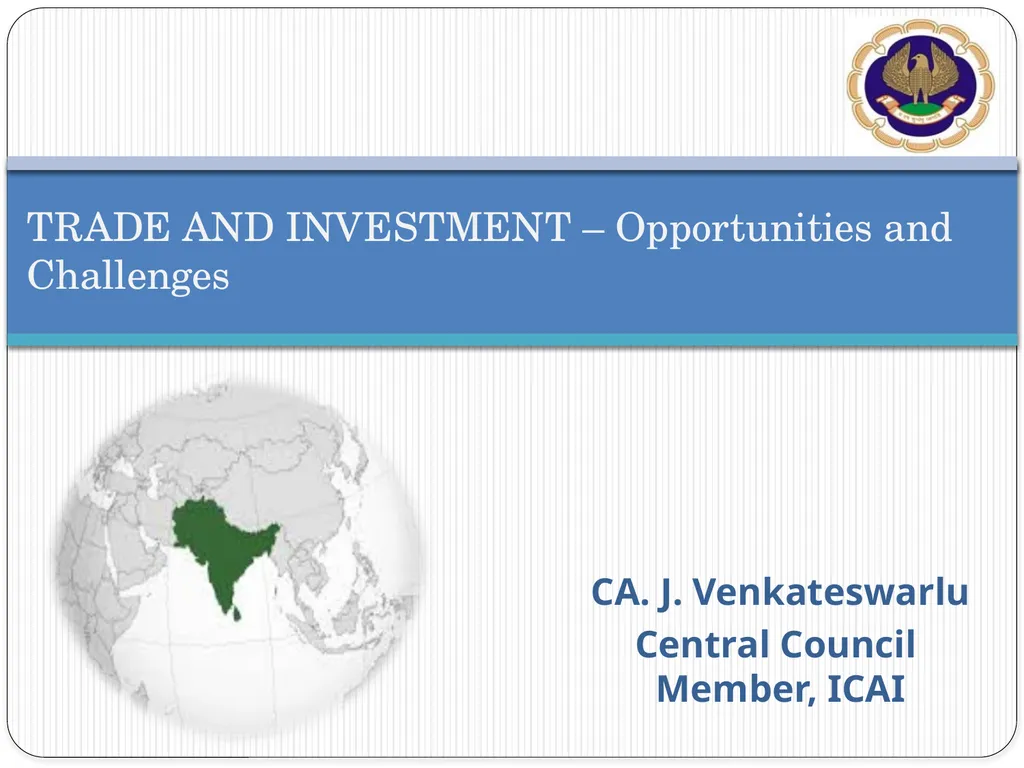TRADE AND INVESTMENT – Opportunities and
Author : cheryl-pisano | Published Date : 2025-05-10
Description: TRADE AND INVESTMENT Opportunities and Challenges CA J Venkateswarlu Central Council Member ICAI Brief 2 The South Asia Region is among the developing regions of the world accounting for about 24 of worlds population40 of Asias
Presentation Embed Code
Download Presentation
Download
Presentation The PPT/PDF document
"TRADE AND INVESTMENT – Opportunities and" is the property of its rightful owner.
Permission is granted to download and print the materials on this website for personal, non-commercial use only,
and to display it on your personal computer provided you do not modify the materials and that you retain all
copyright notices contained in the materials. By downloading content from our website, you accept the terms of
this agreement.
Transcript:TRADE AND INVESTMENT – Opportunities and:
TRADE AND INVESTMENT – Opportunities and Challenges CA. J. Venkateswarlu Central Council Member, ICAI Brief 2 The South Asia Region, is among the developing regions of the world, accounting for about 24% of world’s population(40% of Asia’s population). The region falls short on most accounts like poverty, health, human development and education. Trade and investments are tools to make the region take long strides for the development of education, health infrastructure, reduction of poverty, prosperity among the region. The trade provides opportunity for people to people interaction, employment to youth, collaborate in sectors like infrastructure, energy, technology development etc. The regional trade has remain beyond its potential, which is and essential ingredient to the prosperity of the region. The Govt.’s, must work together to enhance the trade and investment across South Asia region ….. Trade & Investment Key to Fulfilling Billion Dreams, Billion Aspirations SUSTAINING RAPID GROWTH IN SOUTH ASIA 3 South Asia which includes eight countries - Afghanistan, Bangladesh, Bhutan, India, Maldives, Nepal, Pakistan and Sri Lanka, has made good progress on liberalizing trade regimes and cutting tariffs since the early 1990s when most of the countries started with reforms. The countries have also undertaken considerable industrial deregulation and other structural reforms. The governments and the private sector recognize that strong exports are critical for overall economic growth and poverty reduction and export-led growth has become a key thrust in each country. Each country has been integrating with the global economy, as evidenced by the significant increases in the merchandise trade [(exports plus imports)-GDP] ratios. SUSTAINING RAPID GROWTH IN SOUTH ASIA 4 According to the World Bank report, in the last quarter of 2014, South Asia was already the fastest-growing region in the world. According to the twice-a-year South Asia Economic Focus report, regional growth is projected to steadily increase from 7 percent in 2015 to 7.6 percent by 2017 through maintaining strong consumption and increasing investment. REGIONAL ECONOMIC INTEGRATION IN SOUTH ASIA 5 Formation of SAARC, 1985 Recognition of complementarities – Committee on Economic Cooperation – Trade, Manufactures and Services study, 1991 Trade liberalization: SAPTA, 1994 SAFTA, 2004: Implementation time frame 2006-16 Bilateral FTAs: India-Sri Lanka Unilateral preferences: India-Nepal, India-Bhutan, India-Afghanistan RTAs & INDUSTRIAL RESTRUCTURING SOUTH ASIA 6 Encouraging results from limited experiences SAPTA: trade gains by smaller countries India-Sri Lanka FTA: expansion of trade with narrowing of trade deficit + diversification of SL export basket; Indian companies














